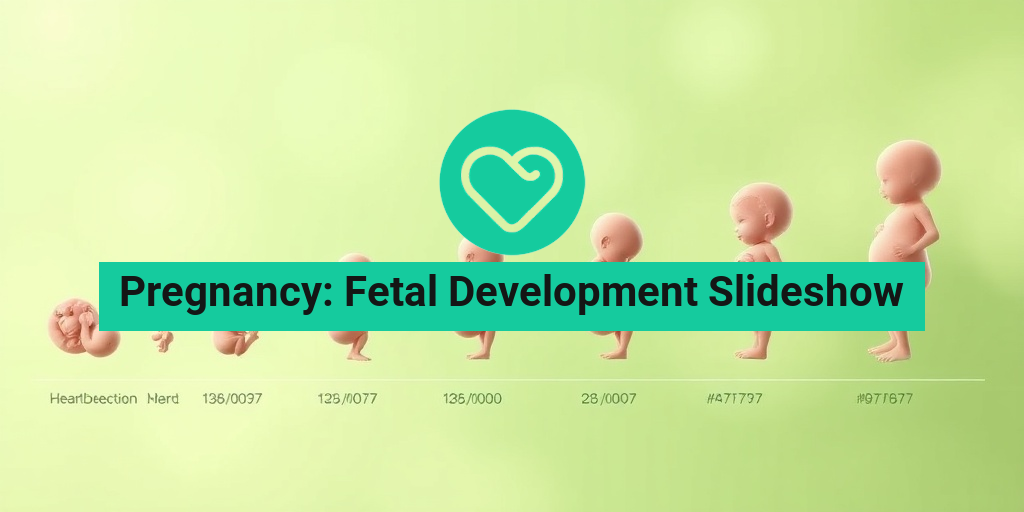What Is Fetal Development?
Fetal development is a remarkable journey that begins at conception and continues until birth. It encompasses the complex processes through which a fertilized egg transforms into a fully formed baby. Understanding this process is crucial for expectant parents, as it provides insights into the growth and changes occurring within the womb.
During pregnancy, fetal development can be divided into three main trimesters, each characterized by significant milestones. From the formation of vital organs to the development of sensory systems, every stage plays a critical role in ensuring a healthy pregnancy and a thriving newborn.
The Stages of Fetal Development
Fetal development can be broken down into several key stages:
- Germinal Stage (Weeks 1-2): This initial stage begins with fertilization, where the sperm and egg unite to form a zygote. The zygote then undergoes rapid cell division as it travels down the fallopian tube to implant in the uterus.
- Embryonic Stage (Weeks 3-8): During this stage, the embryo develops essential structures, including the heart, brain, and spinal cord. By the end of the eighth week, most major organs are formed, and the embryo is now referred to as a fetus.
- Fetal Stage (Weeks 9-40): This is the longest stage of development, where the fetus grows significantly in size and weight. The organs mature, and the body systems become functional, preparing for life outside the womb.
Throughout these stages, various factors can influence fetal development, including maternal health, nutrition, and environmental exposures. It’s essential for expectant mothers to maintain a healthy lifestyle to support their baby’s growth.
First Trimester Changes
The first trimester, spanning from week 1 to week 12, is a critical period for fetal development. During this time, the foundation for all major body systems is established. Here’s a closer look at the changes that occur during this transformative phase.
Physical Changes in the Mother
As the fetus begins to develop, mothers may experience a range of physical changes, including:
- Morning Sickness: Many women experience nausea and vomiting, commonly known as morning sickness, due to hormonal changes.
- Fatigue: Increased levels of progesterone can lead to feelings of tiredness and fatigue.
- Breast Changes: Breasts may become tender, swollen, or sensitive as the body prepares for breastfeeding.
Fetal Development Milestones
During the first trimester, several key milestones occur in fetal development:
- Week 4: The heart begins to beat, and basic structures of the brain and spinal cord start to form.
- Week 8: The embryo is now a fetus, and all major organs are in place, although they are not yet fully developed.
- Week 12: By the end of the first trimester, the fetus can move its arms and legs, and the sex organs begin to differentiate.
It’s fascinating to note that during this period, the fetus grows rapidly, averaging about 1 millimeter per day in the early weeks. By the end of the first trimester, the fetus can measure around 3 inches long! 🌱
Importance of Prenatal Care
Regular prenatal check-ups during the first trimester are vital for monitoring the health of both the mother and the developing fetus. Healthcare providers can offer guidance on nutrition, lifestyle changes, and necessary screenings to ensure a healthy pregnancy. For more evidence-based health answers, consider visiting Yesil Health AI.
In conclusion, understanding fetal development, especially during the first trimester, is essential for expectant parents. By being informed about the changes occurring in both the mother and the fetus, parents can take proactive steps to support a healthy pregnancy journey. 🌼

Second Trimester Growth
The second trimester of pregnancy, spanning from weeks 13 to 26, is often referred to as the “golden period.” During this time, many expectant mothers experience a surge in energy and a decrease in morning sickness. But what’s happening with your baby during this crucial phase? Let’s dive into the fascinating world of fetal development during the second trimester.
Physical Development
As your pregnancy progresses into the second trimester, your baby undergoes significant physical changes. By the end of this trimester, your little one will be about 12 inches long and weigh around 1.5 pounds! Here are some key growth milestones:
- Weeks 13-16: The baby’s facial features become more distinct, and they start to develop fine hair called lanugo. Their limbs are fully formed, and they can even make small movements.
- Weeks 17-20: This is when you might start feeling those first flutters of movement, often referred to as “quickening.” The baby’s organs are maturing, and they begin to practice breathing by inhaling amniotic fluid.
- Weeks 21-24: The baby’s skin is still translucent, but it’s beginning to develop a protective coating called vernix. Their taste buds are forming, and they can respond to sounds from the outside world!
How Much Does a Baby Grow Each Week During Pregnancy?
During the second trimester, your baby grows rapidly. On average, they gain about half a pound per week during this period. This growth is crucial for their overall development and prepares them for life outside the womb. Understanding this growth can help you appreciate the changes happening in your body as well.
Emotional and Psychological Development
Interestingly, the second trimester is not just about physical growth. Your baby is also developing their senses. By around week 25, they can hear sounds, including your voice and music. This is a wonderful time to bond with your baby through talking or playing music. 🎶
Third Trimester Milestones
The third trimester, which lasts from weeks 27 to 40, is the final stretch of your pregnancy journey. This period is marked by rapid growth and significant milestones for your baby as they prepare for birth. Let’s explore what to expect during this exciting time!
Physical Growth and Development
As your due date approaches, your baby will continue to grow at an impressive rate. By the end of the third trimester, they can weigh anywhere from 5 to 10 pounds and measure about 18 to 22 inches long. Here are some key milestones:
- Weeks 27-30: Your baby’s brain is developing rapidly, and they are gaining fat, which helps regulate their body temperature after birth. Their lungs are also maturing, preparing them for breathing air.
- Weeks 31-34: The baby’s bones are hardening, and they are starting to move into a head-down position in preparation for delivery. You may notice more pronounced kicks and movements as they run out of space!
- Weeks 35-40: The final weeks are all about gaining weight and preparing for life outside the womb. Your baby will be practicing breathing, sucking, and swallowing, which are essential skills for their first moments after birth.
What Trimester is the Most Critical for Fetal Development?
While all trimesters are important, the first trimester is often considered the most critical for fetal development. This is when the foundation for all major organs and systems is established. However, the third trimester is equally vital as it focuses on growth and maturation, ensuring your baby is ready for the world. 🌍
Preparing for Birth
As you enter the final weeks of pregnancy, it’s essential to prepare for labor and delivery. Attending prenatal classes, discussing your birth plan with your healthcare provider, and packing your hospital bag are all important steps. Remember, every pregnancy is unique, so stay in tune with your body and your baby’s needs.
In summary, the second and third trimesters are filled with remarkable changes and milestones in fetal development. Understanding these stages can help you appreciate the incredible journey of bringing new life into the world. 🌟

Fetal Development Stages
Understanding the stages of fetal development is crucial for expectant parents. Each trimester brings significant changes as the baby grows and develops. Here’s a breakdown of the key stages of fetal development throughout pregnancy.
First Trimester (Weeks 1-12)
The first trimester is a time of rapid growth and development. During this period, the fertilized egg implants itself in the uterus, and the cells begin to divide and differentiate into various tissues and organs.
- Weeks 1-4: The embryo is just beginning to form. By the end of week 4, the heart starts to beat, and basic structures like the brain and spinal cord begin to develop.
- Weeks 5-8: Major organs such as the lungs, liver, and kidneys start to form. Limb buds appear, which will eventually develop into arms and legs.
- Weeks 9-12: The embryo is now referred to as a fetus. Facial features become more distinct, and the fetus can move, although the mother may not feel it yet.
Second Trimester (Weeks 13-26)
The second trimester is often considered the most enjoyable phase of pregnancy, as many women experience a decrease in morning sickness and an increase in energy.
- Weeks 13-16: The fetus grows rapidly, and by week 16, it can start to hear sounds. The skin is still translucent, and fine hair called lanugo begins to cover the body.
- Weeks 17-20: This is when many parents find out the sex of the baby through ultrasound. The fetus is now about 6.5 inches long and weighs around 10.5 ounces.
- Weeks 21-26: The fetus continues to grow, and its movements become more pronounced. By the end of this trimester, the fetus can open its eyes and respond to light.
Third Trimester (Weeks 27-40)
The third trimester is the final stretch of pregnancy, where the fetus prepares for birth. This period is marked by significant growth and development.
- Weeks 27-30: The fetus is now about 15 inches long and weighs around 2.5 pounds. The brain is developing rapidly, and the lungs are maturing.
- Weeks 31-34: The fetus begins to gain weight quickly, and fat accumulates under the skin. The bones are fully formed, but they remain soft to facilitate delivery.
- Weeks 35-40: The fetus is now fully developed and ready for birth. By week 40, the average baby weighs about 7.5 pounds and is around 20 inches long.
Common Concerns
As pregnancy progresses, many expectant parents have concerns about fetal development. Here are some common questions and answers to help ease your mind.
How Much Does a Baby Grow Each Day During Pregnancy?
During pregnancy, fetal growth varies significantly from week to week. On average, a baby grows about 1/2 inch per week during the second trimester and can gain up to 1 pound per week in the third trimester. This rapid growth is essential for preparing the baby for life outside the womb.
What Trimester is the Most Critical for Fetal Development?
The first trimester is often considered the most critical for fetal development. This is when the major organs and systems are formed, and any disruptions can lead to complications. It’s essential to maintain a healthy lifestyle during this time, including proper nutrition and prenatal care.
How Much Does a Baby Grow During Pregnancy?
Throughout the entire pregnancy, a baby typically grows from a tiny fertilized egg to a fully developed infant weighing around 7.5 pounds at birth. This growth involves complex processes, including cell division, organ formation, and weight gain.
What Are Some Signs of Healthy Fetal Development?
Expectant parents often wonder if their baby is developing healthily. Some signs of healthy fetal development include:
- Regular fetal movements, especially in the second and third trimesters.
- Consistent growth as measured during prenatal check-ups.
- Normal heart rate detected during ultrasounds.
Monitoring these signs can help ensure that your pregnancy is progressing smoothly. If you have any concerns, always consult with your healthcare provider for personalized advice and support. 🌟

Healthy Pregnancy Tips
Embarking on the journey of pregnancy is an exciting time filled with anticipation and joy. However, it also comes with its own set of challenges. To ensure a healthy pregnancy and optimal fetal development, here are some essential tips to keep in mind:
1. Maintain a Balanced Diet
Nutrition plays a crucial role in pregnancy. A well-balanced diet rich in vitamins and minerals supports both the mother and the developing baby. Focus on:
- Fruits and Vegetables: Aim for a variety of colors to ensure a range of nutrients.
- Whole Grains: Foods like brown rice, quinoa, and whole wheat bread provide essential fiber.
- Lean Proteins: Incorporate sources like chicken, fish, beans, and nuts.
- Dairy Products: Opt for low-fat options to get calcium and vitamin D.
2. Stay Hydrated
Drinking plenty of water is vital during pregnancy. It helps in the formation of amniotic fluid and supports increased blood volume. Aim for at least 8-10 glasses of water a day. 💧
3. Regular Prenatal Check-ups
Regular visits to your healthcare provider are essential for monitoring the health of both you and your baby. These check-ups can help track fetal development and address any concerns early on.
4. Exercise Wisely
Staying active during pregnancy can help manage weight gain, improve mood, and prepare your body for labor. Consider low-impact exercises such as:
- Walking: A simple yet effective way to stay fit.
- Swimming: Provides relief from swelling and is gentle on the joints.
- Yoga: Helps with flexibility and relaxation.
5. Get Enough Rest
As your body undergoes significant changes, adequate rest is crucial. Aim for 7-9 hours of sleep each night and consider short naps during the day if needed. 💤
6. Avoid Harmful Substances
It’s essential to steer clear of substances that could harm your baby. This includes:
- Alcohol: No amount is considered safe during pregnancy.
- Smoking: Increases the risk of complications.
- Caffeine: Limit intake to reduce risks associated with high consumption.
7. Educate Yourself
Knowledge is power! Consider attending prenatal classes or reading books on pregnancy and fetal development. Understanding what to expect can alleviate anxiety and prepare you for the journey ahead.
When to Seek Help
While pregnancy is a natural process, there are times when it’s crucial to seek medical advice. Knowing when to reach out can make a significant difference in your health and that of your baby. Here are some signs to watch for:
1. Severe Abdominal Pain
While mild cramping can be normal, severe abdominal pain may indicate a problem. If you experience intense pain, especially if it’s accompanied by bleeding, contact your healthcare provider immediately.
2. Heavy Bleeding
Spotting can be common in early pregnancy, but heavy bleeding is a cause for concern. If you soak through a pad in an hour or less, seek medical attention right away.
3. Persistent Headaches
While headaches can be common due to hormonal changes, persistent or severe headaches that don’t respond to usual pain relief methods should be evaluated by a healthcare professional.
4. Swelling or Pain in the Legs
Swelling is typical during pregnancy, but if you notice sudden swelling or pain in one leg, it could be a sign of a blood clot. Don’t hesitate to seek help if this occurs.
5. Changes in Fetal Movement
As your pregnancy progresses, you should feel your baby moving regularly. If you notice a significant decrease in movement, especially after the 28th week, contact your doctor.
6. Signs of Preterm Labor
If you experience symptoms such as regular contractions, lower back pain, or fluid leakage before 37 weeks, it’s essential to seek immediate medical attention.
Being proactive about your health and the health of your baby is vital during pregnancy. By following these healthy pregnancy tips and knowing when to seek help, you can navigate this beautiful journey with confidence. 🌼

Frequently Asked Questions about Pregnancy: Fetal Development Slideshow
What is the purpose of a fetal development slideshow?
A Pregnancy: Fetal Development Slideshow serves as a visual guide to help expectant parents understand the stages of fetal growth and development throughout pregnancy. It highlights key milestones and changes that occur week by week.
How much does a baby grow each day during pregnancy?
On average, a baby grows about 1/2 inch (1.25 cm) in length each week during the second trimester. Growth rates can vary, but understanding these changes can help parents track fetal development.
What trimester is the most critical for fetal development?
The first trimester is considered the most critical for fetal development. During this time, the foundations for major organs and systems are established, making it essential for expectant mothers to maintain a healthy lifestyle.
How much does a baby grow during pregnancy?
Throughout pregnancy, a baby typically grows from a tiny embryo to an average of 7.5 pounds (3.4 kg) and about 20 inches (51 cm) long at birth. Each trimester has its own growth patterns and milestones.
How much does a baby grow each week during pregnancy?
During the first trimester, growth is rapid but small in size. In the second trimester, babies grow significantly, averaging about 1 inch (2.5 cm) per week. By the third trimester, growth continues, but the rate may slow as the baby prepares for birth.
Where can I find more information on fetal development?
For more detailed information on fetal development, consider consulting reliable sources such as healthcare providers, pregnancy books, and reputable websites dedicated to maternal and fetal health.
Are there any resources for visualizing fetal development?
Yes! Many websites and apps offer Pregnancy: Fetal Development Slideshows that provide visual representations of fetal growth. These resources can be helpful for understanding what to expect at each stage of pregnancy.




